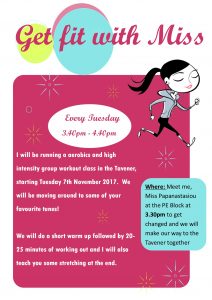Having spent this training year in my block placement school, I feel somewhat sad to leave the students with whom I have formed good relationships with; students whom I have got to know, through teaching, joking, my enrichment club and conversations around school. This has, however, introduced me to the difficulties teachers face when considering leaving a school and moving on; do they stay for these relationships or do they do what is needed to improve their career and/or work life balance?
Being ‘liked’ was very important to me at the beginning of my time at St Andrews. I realised in just a few days that I would need to do something in order to build and develop relationships with these students, as I have to admit, I was shocked by the extent of challenging behaviour; the kind of behaviour I would expect to see in a PRU, not in a Church of England state school. But then, this just highlighted how much I had to learn about school and the education system in the UK. I went from wanting to be ‘liked’ to wanting to be ‘respected’. I have come to realise that students really do need to know the importance of respect, not that I expect students to bow down to me, but more because I would like students to move into the world of work with values that show respect and kindness towards others. Moreover, given the nature of my subject, Religious studies, students feel they do not need to know the things I teach them. I have explained the importance of trying your hardest in everything you do, no matter where or when you will need the knowledge; it is the act of trying hard in school which will set you up for life after school.
In the workplace, trying hard means working hard and earning the money, valuing that money because you have worked hard for it. All too often in my block placement school I have had discussions with students about what they will do after school. I hear rapper, footballer, model, singer and astrophysicist! I admire the aspirations of these students, and I want to nourish that. For me, it is important they have a realistic approach to their studies and achieving their dreams. I motivate them to aim higher, but I also give them the tools to pave their journey to the top. It is important they know Christian values, as my block placement is a faith school. It is also important they recognise diversity through understanding the reasons behind the diversity, because they are well educated and have open minds in school where we facilitate debates and discussions.

This led me to also realise how much I had to learn about my own subject. Having completed a subject enhancement course prior to beginning my PGCE, I thought I knew far more than I do! This made me feel nervous but also inspired me to push my own learning further as I did not want to be unprepared for a classroom situation! I had been told, ‘don’t worry Lizzy, all you need to do is be 1 lesson ahead of the kids!’ Not helpful! In order to be able to teach, you need to know what you are teaching AND the surrounding context, including where this topic fits into the schools schemes of work or if GCSE, how it fits in to the learning required for the exams.
In the wider context, I feel that I now have a good foundation of the bare bones needed in order to work within an environment that can harbour safeguarding issues, issues with vulnerable children and those with SEN. I have completed online safeguarding training that covered issues with abuse, bullying and neglect. We have had in school ‘twilight’ training which has covered safeguarding, OFSTED and raising achievement of students in school. I have attended all after school training, including meetings with SIAMS and departmental meetings. I have sat in as a class teacher during interviews and been a part of 2 geography field trips. I have worked closely with students of other faiths and from various countries around the world to assist in art and prayer space projects at my block placement school.

I have now, at this stage, achieved far more than I imagined. However, I also appreciate, at this stage, that there is still a lot I need to do in order to be where I want to be. I can produce lessons, resources and Schemes of work. I can differentiate, communicate with parents and teachers, and teach difficult subjects. I can analyse data, through data drops and mark thoroughly and constructively. I understand how to follow schools behaviour management policies, and take the right steps to issue sanctions accordingly. I can build relationships, promote a love of learning in my teaching environment, and recognise signs that may be safeguarding issues. Across my training, I have learnt pedagogical approaches, creativity and now have a wealth of educational planning knowledge that I hope I can put into practice during my NQT year.
I have taken considerable knocks during the year, to my confidence and at times, my pride. When being watched and your actions observed in detail, then being recalled to you, it can at times bring on the cringe! I have said some very strange things during lessons, being shell shocked by weird behaviour and been tongue tied at some of the questions I have been asked. Above all, I have these challenges, knock backs and turned them into constructive criticism which I can work on, improve on and grow from. I feel I have come so far to achieve these things; 2 schools, 2 mentors, 2 full terms teaching and a whole lot of marking! I now know that true meaning of reflection; it filters through into my personal life and actually, has seen me grow in my character and ability to tackle difficult situations. People always tell me that you never stop learning when you are a teacher; that you constantly feel challenged and inspired simultaneously, and no two days are the same. Now that I am so so close to the end of my teacher training, I can honestly and wholeheartedly say that I am excited for my NQT, ready for a challenge, and BRING IT ON!




